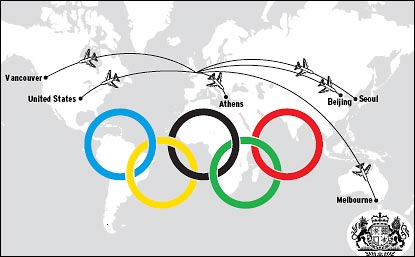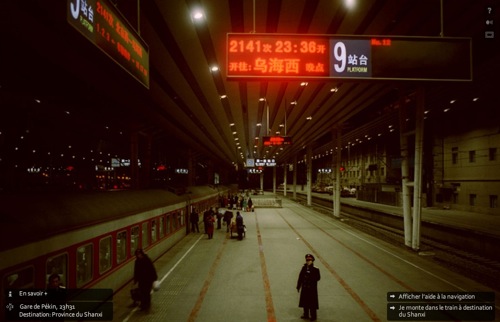
A friend introduced me to this interesting web documentary about coal mines which is essentially made of pictures and sounds/voices, and where you are a journalist who can choose which actions you want to do, where to go, and which questions to ask. Choices are actually not that many, but I still found interesting to have this interactive documentary. That could be an interesting way to use my records. We could even imagine more, and choose a few topics we would like to work on and think about how to illustrate them with pictures, records, artworks, etc. What is also interesting is that in every image you have the possibility to explore more information, watch the map, etc.
Posts tagged ‘项目 project’
 时间 posted on: 20 April 2010 |
时间 posted on: 20 April 2010 |  发布者 author: b |
发布者 author: b |  comment (1) |
comment (1) |
very simple project, easy to engage, and really perfect address to dutch cultural tendencies!
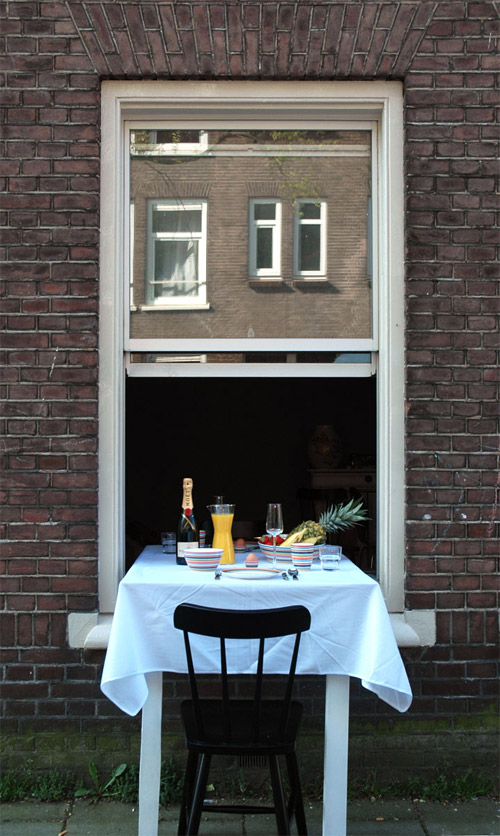
window event 03
title: BREAKFAST
date: Wednesday may 6th
window: Private home, Indische Buurt
Delicious breakfast for two. At a table that connects street and living room. Inside and outside. They belong together.
City-eyes addresses the border between the private and public domain. Subject of research are the Amsterdam windows: as windows are the eyes of the city. City-eyes offers a personal view into the souls of Amsterdam homes and thereby reveals the city’s hidden stories.
All window events are miniature test cases, playing with the characteristics of the window as a screen between interior and exterior. This way, one’s private parquet will be part of the outdoor pavement for a moment, and the city becomes home.
see the entire series: http://www.city-eyes.nl/
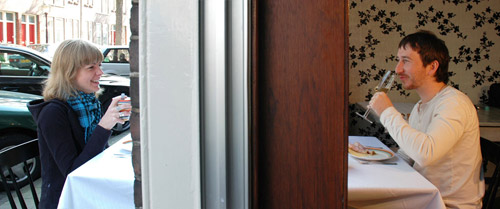
 时间 posted on: 6 February 2010 |
时间 posted on: 6 February 2010 |  发布者 author: e |
发布者 author: e |  comment (1) |
comment (1) |
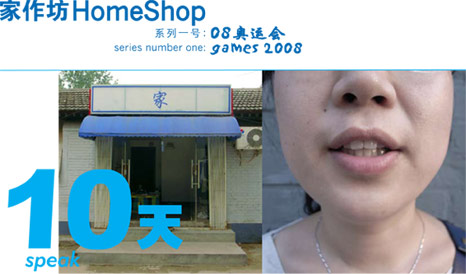
在现实生活中,人与人往往有交流的障碍,不知道该说什么,总是觉得有这样或那样的束缚,其实“说”很简单,只要张开你的嘴。
“说”是一个互动的活动,探讨人与人之间的交流,而最直接的交流莫过于“说”。任何一个人都可以和作者谈话5分钟、在这5分钟内、你可以说你当时想说的任何话、你可以提问、作者也可以提问、你可以选择回答和不回答、作者也可以选择回答和不回答。总之这5分钟你们二人只要在说就可以、你们的话题是任意的、你想说什么就说什么、你想发出什么声音就发出什么声音、不要理会别人是否能听懂、也不要理会谁会嘲笑你、作者会陪伴你度过这快乐的5分钟、两个人尽情享受“说”的愉悦。
On Friday, 15 August, from 14:00-17:00, visitors to HomeShop can participate in an interactive experiment with our speaker, Cassidy Cui. In five-minute dialogues with visitors, any topic may be explored, questions asked and answers given or not. Others may listen in, or perhaps no one will understand, but for five small minutes, Cassidy will accompany the visitor in a simple attempt at human communication in bare form. “Speak” is a small pause amidst the noise and orchestrated hearsay of the everyday, simply to enjoy the pleasure of communication. “It’s as simple as opening your mouth”. 有时间过来玩儿!(If you have time, come over and play!)
-----
日程安排 More events coming up:
14.08.08 | 北京批判理论阅读小组——关于哈贝马斯的公共空间理论的批判阅读. Critical Reading Group reads Habermas and Petrescu
16.08.08 | “失败者”的大派对,有DJ Mellow Yellow以及蔡凯、何颖雅、任波的录象作品放映. street party for the losers featuring DJ Mellow Yellow and screening of artist films by Ralf Schmerberg/Radical Media, Cai Kai, Renbo and others
16.08.08 | Sean Smith组织的人人可以参与的“Wii”上奥运会. post event broadcast Wii-version instant replays organised by Sean Smith
TBA | 艺术家粱越的行为艺术表演. performance and give-aways by artist Liang Yue
TBA | 《女泉》尿尿比赛. men/women pissing match
 时间 posted on: 14 August 2008 |
时间 posted on: 14 August 2008 |  发布者 author: e |
发布者 author: e |  comment (1) |
comment (1) |
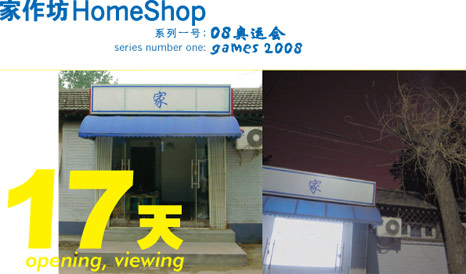
家作坊系列一号。伴随着2008年8月8号北京奥运开幕式一同开放,我们在胡同里看奥运(他们没有提到的户外屏幕),陪王大爷和街坊们一起吃吃喝喝,还有家作坊牌超大屏幕。比电视机大——但比世贸天街略小…
20:00开始,到你上床睡觉才算结束。带个小板凳会更加轻松!(同时给何颖雅庆祝生日!)
HomeShop series number one officially launches on the 8th of August, 2008, with a hutong live site for viewing the opening ceremonies of the Olympic games in Beijing. Hang out with Grandpa Wang and the neighbours in the fresh air, enjoy drinks, snacks and a sporty-sized LED projection from the HomeShop window front. It’s bigger than your TV—maybe a bit smaller than The Place.
From 20.00 until bedtime… Bring a wooden stool for even more relaxing! (And come celebrate Elaine’s birthday!)
——–
日程安排 More events coming up:
09-10.08.08 | 收集和出售二手衣服、家坊牌酸梅汤、中英奥运词汇小课堂. storefront sale of homemade plum juice and secondhand clothing buy/sell; English/Chinese lessons for Olympics speak
14.08.08 | 北京批判理论阅读小组——关于哈贝马斯的公共空间理论的批判阅读. Critical Reading Group reads Habermas
16.08.08 | “失败者”的大派对,有DJ Mellow Yellow以及蔡凯、Renbo的录象作品放映. street party for the losers featuring DJ Mellow Yellow and screening of artist films by Radical Media, Cai Kai, Renbo and others
TBA | 人人可以参与的“Wii”上奥运会. post event broadcast Wii-version instant replays
TBA | 艺术家粱越的行为艺术表演. performance and give-aways by artist Liang Yue
TBA | 崔凯旋将和大家开每人5分钟的会. ‘Talk’ sessions by Cassidy Cui
TBA | 关于体育理论学者Sean Smith的采访对话. discussion with critical sports theorist Sean Smith
 时间 posted on: 7 August 2008 |
时间 posted on: 7 August 2008 |  发布者 author: e |
发布者 author: e |  Comments Off on 17天: opening, viewing |
Comments Off on 17天: opening, viewing |
参 与 倡 议
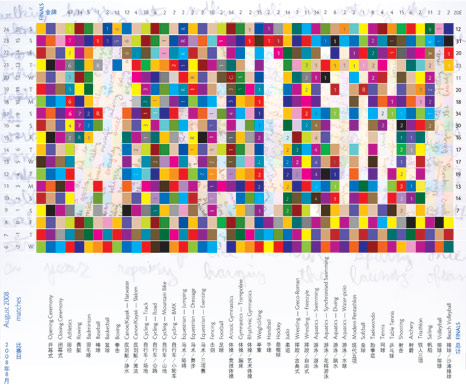
从二零零八年八月八日晚八点开始至八月二十四日的闭幕式为止,一系列以奥运与北京当地居民社区的交汇为契机的活动将在位于北京市中心小经厂胡同的一 个不起眼的小地方展开[1]。这一亩三分地既是店面,又是本次活动举办人生活,起居的地方。它象征着公共空间与私人空间,商品交易与自由兑换的重叠. 在奥运期间的这些活动旨在探讨,记录,与创造我们在奥运宏观规划下作为个体的可能性,缩短时间表与平常老百姓间的距离,或者更确切地说,在距离中安身立 命。我们在此诚挚地期待你的参与,观摩,与嬉戏.
如有问题,建议,好主意请e-mail ho [at] iwishicoulddescribeittoyoubetter [点] org 或致电至137.1855.6089. 虽然我们现在还没有正式的活动经费,如果你所建议的活动需要某种设备或有其他需要,请与我们联系,我们将尽可能地向你提供帮助. 你可以在任何时候把你的想法告诉我们,包括奥运期间。而且你并不需要训练有素。
活动内容:
。奥运现场转播(街边投影)
。街头即兴录像
。街边日志[2]与现场赛事解说
。零食,饮料出售
。北京批判理论阅读小组学术论坛
。体育词汇解析
参与者:
。北京批判理论阅读小组
。蔡凯 - 艺术家,设计师
。崔凯旋 - 老师
。段宝林 Pauline Doutreluingne - 策展人, DJ
。分司厅小学暑期班小朋友
。Beatrice Ferrari - 地理学,空间规划研究; 洛桑联邦理工学院
。高大哥 - 隔壁邻居,保安
。何颖雅 - 艺术家,设计师
。粱越 - 艺术家
。欧阳潇 - 艺术工作者,哲学学者
。任波 - 导演,艺术家
。Sean Smith - 批判理论家,布拉克大学,博士生在读,欧洲研究生院
。王大爷 - 对门儿邻居,退休音乐家
。王大姐 - 房东,地铁售票员
。郑大哥 - 隔壁邻居,邮递
活动随时更新及日程安排请登陆这个播客。在奥运会期间家作坊每天都会对外开放。家作坊活动由何颖雅和欧阳潇发起。并希望是一系列以当地居民社区为基础而形成的艺术创作。人际网络与家的探索的开始。在本次活动中所搜集的文章,想法及讨论都将收录于奥运结束之后出版的小册子上。
--------
[1] 家作坊受到很多来自于Cybermohalla的启发,他们的网址:
http://www.sarai.net/practices/cybermohalla/minor-practices
[2] 《街道是平庸重复的空间,是与物质世界的相遇,是人与人,事与事之间的偶然集结。街道也由此进入我们的谈话。在街头一站,静静地观察街道的一举一动可以让其重新在谈话与思考中出现,并会被赋予新的思想深度. 在2004年,Cybermohalla利用街头日志这个形式重新审视了一切在我们生活周围看似熟悉与平凡的事物,从而试图找到这些事物中的断层与潜在走向。》(Cybermohalla)
 时间 posted on: 24 July 2008 |
时间 posted on: 24 July 2008 |  发布者 author: e |
发布者 author: e |  Comments Off on 家作坊系列一号: 08奥运会 |
Comments Off on 家作坊系列一号: 08奥运会 |
A recent article in the Telegraph makes light of the fact that Olympics is very far from home indeed: it seems the initial excitement about London 2010 is already raising inland eyebrows. Recent questionably high numbers of taxpayer-funded junkets have been made by political committee members in the name of investigating and learning from former Olympic host cities. In light of this globe-trotting, it may be obvious to note the displaced understandings here of what it means for the Olympics to ‘bring the world together’. Togetherness in this case in not local, and what we think of as global seems to come together in these instances under the arenas of national competition, representation and one-upmanship. Not to dismiss the value brought to the athletes via their experiences (and those of their entourages, the officials and the press), the localities produced by the Games seem far removed from the reality of its host city, and it is rather the case that the local must be sold to its own people in terms of consumables, media and economic boosts via jobs, tourism and other short term et ceteras. In the cases of British research junkets and the year-long torch relay for the Beijing 2008 Olympics, it looks a lot more like post-colonialism in the name of cosmopolitanism (and in the above image, the ‘logo’ of the Queen!). The Empire of Sportsmanship is brought back to the local (like the glorious cat’s dead prey dropped inside the kitchen) whether we like it or not, beginning from the moment that the host city ‘winner’ is announced to however long a particular Olympics morning-after period may last. What is more interesting, then, is to examine how the cosmopolitanism of the Olympics does filter back to local practices, not in terms of illusory togetherness but, hopefully, by means of more sustainable exchanges and sharing in the sense of Jean-Luc Nancy’s inoperative community. Here we can examine the communities that are created not as fixed entities or operations (e.g., Olympics-type cosmopolitanism), but rather look toward dynamics affecting the local long after the ceremonies have closed and ‘cosmopolitan’ has left.
I still remember being quite shocked and moved by the level of excitement and emotion in the faces of all the flag-waving Chinese celebrating in Tiananmen square upon the announcement of Beijing’s bid for the 2008 Olympics. Watching on television from Hong Kong as those interviewed were moved even to tears, even my grandmother took interest and said, “Now at least China won’t bother Taiwan too much for a while longer.”
Seven years later, a friend sits with me at a café on Guloudong Dajie telling me how a crowd gathered one night outside a small shop near his home because the owner refused to move out by the marked date for the shop’s demolition. Its worn facade has in 2008 unfortunately become an unsightly too close to the Forbidden City—-thereby highly visible to the incoming flux of visitors who will likely pass by on their way to visit the palaces. The crowd of those gathered to see a potential forced removal were restless, and complaints over the Olympics roared loadly, with unmentionables like six-four even dared to be recalled in public space. On the other hand, not so far from that hutong my own neighbour has hung a miniature Chinese flag from his car antenna, and when asked by a friend why he has all of a sudden initiated this little act of patriotism, he replies matter-of-factly, “The Olympics will be here soon. Who doesn’t love the country?” (“奥运快到了,谁都不爱国?”)
All of these are ongoing processes within this flux of global-local, and just some of the many layers that we have to examine in order to understand a burgeoning Chinese economy, culture and society and how it finds itself in relation to a larger view. Of course, this is an oversimplification, but we can only begin to understand community when we examine in context its processes and the dynamics underscoring its identity. While the stadium may be left empty after the party (as has been the case with Athens after 2004), there has been in Beijing, for example, amazing amounts of newly-built infrastructure of which the city has long been in need. And what about the loosening up of the press, the acculturation of Beijingers to new tenets of civil society like queueing in line and reducing the usage of plastic bags? Will these things last as long as the fad for “I HEART China” t-shirts? I keep thinking of the over 2 billion trees that have been planted all over Beijing (Xinhua). Let’s hope.
 时间 posted on: 20 July 2008 |
时间 posted on: 20 July 2008 |  发布者 author: e |
发布者 author: e |  comments (5) |
comments (5) |
c a l l . f o r . p a r t i c i p a t i o n

From the 8th of August, 2008 at 8:00 p.m. to the end of the closing ceremonies on the 24th of August, a small space located at Xiaojingchang Hutong in the centre of Beijing will be open to host and organise a series of minor practices[1] that will embark from the crossing points of the local community and the world spectacle of the 2008 Olympic Games. As a commercial storefront space that also hosts its proprietors for living, sleeping and eating, this space represents a metaphorical bringing together of the public and the private, a commercial trade with the common good or open exchange. During the period of the Olympic Games, a number of activities will take place to investigate, document and generate possibilities for our relationships as individuals to the 2008 Olympic plan, the timetable and its juxtapositions with local urban micro-society. This is an open call inviting your agency as participant, observer and player. [download full english project proposal as PDF here, 下载中文方案]
Please address inquiries, ideas and informal proposals for an activity you’d like to initiate by e-mail to: ho [at] iwishicoulddescribeittoyoubetter [dot] org, by telephone at +86 137.1855.6089. While there is no official budget available for any of these events and activities, if certain equipment and/or resources are required, please contact and we will do our best to make suitable arrangements. There is no deadline, and your ideas are welcome for the duration of the Games. Training is not required. 有时间过来玩!(If you have time, come over and play!)
Among the Events planned/possible…
. evening public viewing of Olympic Games via storefront LED projection
. field recordings of the neighbourhood (audio/video)
. public wii games via storefront LED projection
. street-logs[2] and hutong-side live sports announcing
. presentations and/or talks on related work
. storefront sale of refreshments and other goods
. Beijing Critical Reading Group session
. language lessons for sports and netspeak
. street party for Olympic losers
Participants, Potential players…
. Beijing Critical Reading Group participants
. Pauline Doutreluingne – curator, DJ
. summer school students of Fensiting Primary School, two doors down
. Beatrice Ferrari – geography and spatial planning; Ecole Polytechnique Fédérale Lausanne
. big brother Gao – next door neighbour, security guard
. 何颖雅 Elaine Ho – art and design
. 蔡凯 Cai Kai – art and design
. 崔凯旋 Cassidy Cui – professor
. Liang Yue – art and performance
. Ren Bo – filmmaker
. Ouyang Xiao – art and critical theory
. Sean Smith – critical sports theory, Brock University, phD. candidate European Graduate School
. Grandpa Wang – neighbour from the building across the street, retired musician, active ladies man
. big sister Wang and big brother Yue – the landlords, subway ticket vendor
. big brother Zheng – next door neighbour, postal office worker
HomeShop will be open daily by appointment throughout the 2008 Olympic Games in Beijing. A running schedule of all events will be continuously updated on this blog. The HomeShop Games 2008 project is an initiative of 何颖雅 Elaine W. Ho and 欧阳潇 Xiao Ouyang, hopefully the first in a series of community-based investigations of art practices, Beijing, networked spaces and the home. Documentation, essays and other contributions from this series will be compiled for a publication to be produced after the Games. In the case of inclement weather, we can huddle together.
———
[1] See http://www.sarai.net/practices/cybermohalla/minor-practices. A number of the ideas for the HomeShop games project are humbly attributed to the work Cybermohalla.
[2] “Streets are spaces of banal repetitions, encounter with world of things, gathering of people and occasional events. This is also how streets enter our conversations. To stand still in a street or to observe a street over a certain duration of time could make the street re-appear into conversations and thought with renewed vividness and perplexity. Street-logs were evolved by practitioners in 2004 to engage with the familiar and the banal, to find ways of re-thinking and re-imagining its disruptions, surprises and flows” (Cybermohalla).
 时间 posted on: 13 July 2008 |
时间 posted on: 13 July 2008 |  发布者 author: 家作坊 HomeShop |
发布者 author: 家作坊 HomeShop |  comments (6) |
comments (6) |
[translocal, yes! this is an amazing example of something going on here in switzerland that re-invests public spaces with private cultural-political meanings, and i found it incredibly interesting, this monumentalising of text in the form of political sculpture/advertising beacon… below reprinted from Felix Stalder and the Newborn — Undeliverable? project]
A truck is circulating through Zürich. Seven extra-large letters stand on its open holding area. They form the word NEWBORN. At different locations, the trucks pulls up. A rapper, EKI NOX, performs. But the truck has to leave again after a very short time. Will its cargo remain undeliverable?
This intervention examines how multiple, translocal networks constitute themselves in the common local space of Zürich and how they develop specific forms of visibility and invisibility within the public space. The truck with the NEWBORN sign serves as focal point triggering responses which will render these presences visible to all.
The original meaning of the NEWBORN sign will be evident primarily to migrants from the Balkans. Many of them were either present in person, or via the media, when an almost identical sculpture was unveiled at the Mother Theresa Square in Pristina when the independence of the Kosovo was declared (02.17.2008). For the Kosovo-Albanians, that sculpture symbolizes a new phase of their self-constitution. Not just in the Kosovo, but also in Zürich. Since the establishment of the state, the Kosovo-Albanian community in Switzerland is beginning to (re)present itself in the public sphere on their own terms. Kosovo-Albanians will also understand the rapper whose lyrics are partly in Albanian and how he interprets the NEWBORN sign from his individual perspective.
The issue of a ‘new beginning’ is also present in the Swiss political public, not the least through recurring debates over and votes on the conditions under which foreigners can become Swiss citizens. At the same time, a discourse on ‘shifting identities’ seems to offer — if not a new beginning — then at least an alternative conception of ‘post-national’ political identity.
The third layer which circulation of the NEWBORN through the city of Zürich investigates in the capturing of the public space through commercial actors and their interest. The EURO2008, which starts while the intervention is taking place, pushes this development to new dimensions. Across the city highly controlled areas of intensive advertisement (fan zones) are being erected. For those who do not behave according to protocol special temporary detention facilities are being erected so that they can be removed swiftly from the public space. The degree to which the public and imaginary space as already been captured by commercialism will lead most people who see the NEWBORN circulating through the streets to interpret it as just another advertisement signage to be set up somewhere in the city.
The Project NEWBORN — Undeliverable? conducts research into the constitution and interaction of multiple, parallel publics within the local space of Zurich shaped by the dynamics of translocal migration, national identity and globalized commercialism. Such a research endeavor needs to take place in the public space itself. Only by intervening directly the latent, often invisible dynamics can be brought to the surface. Activating existing and triggering new dynamics is an essential
part of the approach. The interventions are being documented and material
will be made available online and offline.
NEWBORN — Undeliverable? will take place June 5-7 in Zürich. The precise locations of the interventions will not be announced in advance. Stay tuned.
 时间 posted on: 5 June 2008 |
时间 posted on: 5 June 2008 |  发布者 author: e |
发布者 author: e |  Comments Off on translocal practices :: newborn |
Comments Off on translocal practices :: newborn |
这是我的北京,这是我的最后的北京 This is my Beijing, my last Beijing. When we look at Chinese cities, we are fascinated by their restlessness, their plastic materiality where stones appear to have lost their resistance. Becoming urban, though, is not only about being in the city. It is also appropriating urbanity through its objects, ideas and moods. It is creating our imaginaire, our Beijing.
突然一阵剧烈的抖动 and what if that tremblement of the train is precisely one of those special moments when the city becomes my city? Richard Sennett told us that cities have the potential to make us more complex human beings. A city is a place where people can learn to live with strangers and enter into the experiences and interests of unfamiliar lives. However, when searching urban life, one encounters a major issue: How do the complexities and diversities of a city interact?
In Western cities, we have allowed public spaces assume this particular task. These are places where people meet, observe, socialize or pass through. This is where we think ourselves as a society. In China, public space doesn’t exist in the same way. Traditional cities were introverted, reproducing a conception of public and private that differs from the one we are familiar with. While anonymity is central in our way of living public spaces and interacting – or not – with strangers, Chinese public interactions are based on the concept of face. It is the community, instead of society, that characterized Mao’s danwei, where residents could avoid unnecessary contacts with unfamiliar situations. Conversely, contemporary urban life multiplies the occasions where one must face anonymity – in the crowd, in the supermarket, while seating on the bus – and these moments often raise hostility. However, urbanity also offers opportunities for faceless encounters, where identities can be negotiated in new ways.
This project explores the subtle lines dividing the private and public notions. These tremblements allow us to appropriate the city but also to share our experiences. These are special times and spaces, encounters and disjunctures, allowing us to be part – or not – of our urban environment. These are the lines where we define our social and individual identity. Using photos and videos, we would like to create disturbing situations where norms and practices must be questioned. Our project is a conversation, whether between ourselves and the public, or between Geneva and Beijing, about what makes our cities a bit more urban; a bit more ours.
 时间 posted on: 23 May 2008 |
时间 posted on: 23 May 2008 |  发布者 author: b |
发布者 author: b |  Comments Off on no one lives in the world in general |
Comments Off on no one lives in the world in general |

 分类 filed under:
分类 filed under: 